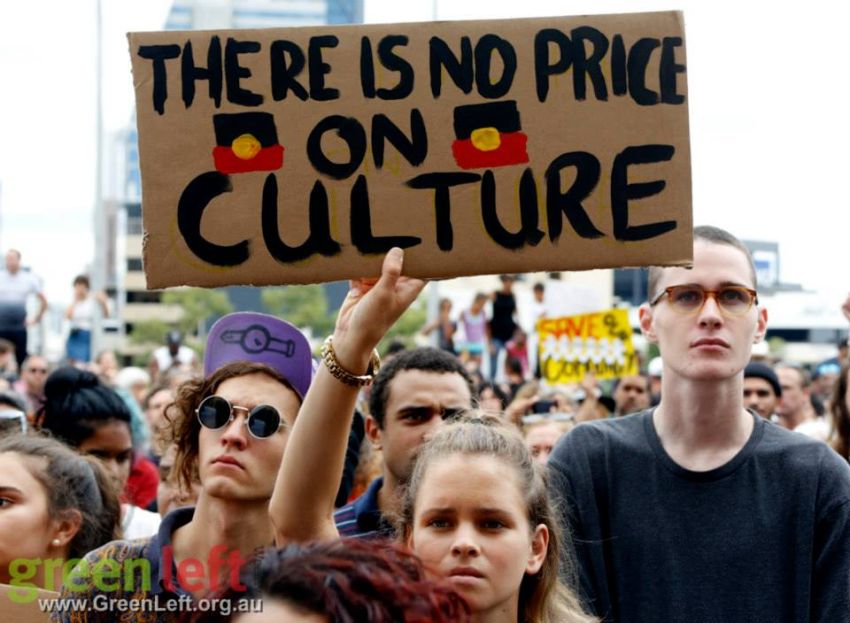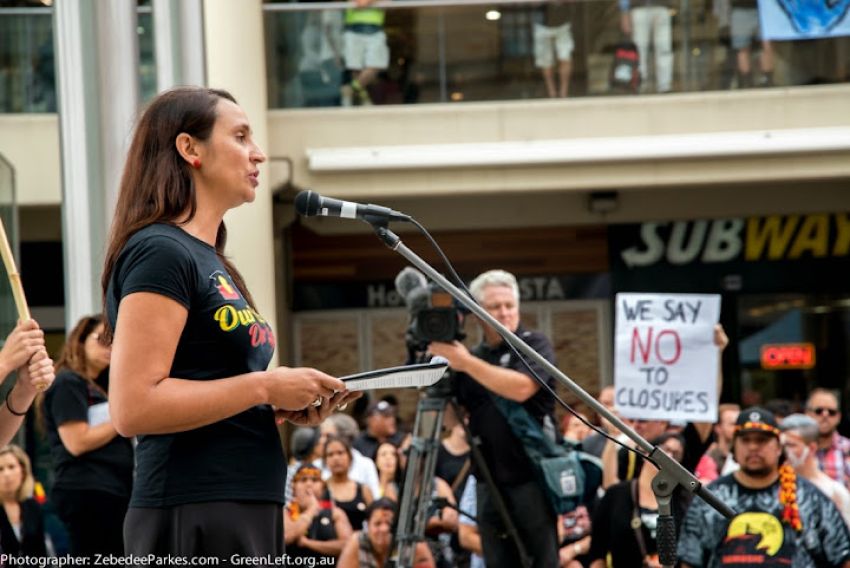
Thousands of people rallied in cities and towns around Australia on March 19 in opposition to the planned closure of around 150 remote Aboriginal communities in Western Australia.
The issue was thrust into the spotlight in September when the federal government — without consultation — announced that it would stop providing funding to these homeland communities from July 1 this year.
At the time, WA Premier Colin Barnett said that closing the communities was not a good option and he acknowledged that it would “cause great distress”. He justified his decision by saying that the state government's hands were tied given the withdrawal of federal funding.
But the racism inherent in the decision was brought into sharp relief when Prime Minister Tony Abbott said that taxpayers could not fund the “lifestyle choice” to live in a remote community.
The federal government has been funding services in remote communities for almost 50 years, according to human rights lawyer Tammy Solonec.
She told a 2000-strong Perth rally on March 19 that government funding began as a result of “their newly obtained powers to legislate for Aboriginal and Torres Strait Islander people after the 1967 referendum.
“They did so to meet Australia's human rights obligations, which we were failing,” she said.
Solonec, who works for Amnesty International, said their research shows that “supporting Aboriginal people to live on their homelands extends their life expectancy [and] improves health outcomes”.
Furthermore she says it “reduces rates of domestic and other violence, allows for participation in decision making, provides connection to land and culture and reduces their exposure to the damaging influences found in larger towns''.

It is primarily to advance these social justice goals — as well as respecting the significant relationship Aboriginal people have with their land — that people are campaigning to save the communities.
Several Aboriginal leaders have pointed out that the cost of closing and relocating the communities could be higher than the cost of making them viable and sustainable. Former Malcolm Fraser government Aboriginal affairs minister Fred Chaney echoes this point.
Racism is also revealed in the fact that nobody is talking about closing non-Aboriginal communities. The Guardian has highlighted the examples of Camballin, Looma and Jarlmadangah — three communities within 30km of each other about 86km south of Derby.
The latter two are Aboriginal communities. The former is not. People in Looma and Jarlmadangah are worried about their future, as the government has given no indication about which communities will close or what criteria will be used to decide. But nobody is talking about closing Camballin.
The Guardian reported that “Indigenous people do not want communities like Camballin closed. But they find the presumption that it and other small non-Aboriginal communities are sustainable and Aboriginal communities are not to be deeply unfair.''
Also important is the issue of native title. Native title is deeply flawed as a mechanism to recognise Aboriginal land ownership. It falls a long way short of genuine land rights but does confer some rights.
In order to claim native title, it is essential for an Aboriginal community to prove continuous connection with an area of land. Forcing communities away from their homelands will make it much harder to prove this connection.
Many people are concerned that moving communities from their homelands will make it easier to advance mining projects — particularly unconventional gas fracking —in those areas.
Recently, Barnett shifted his rhetoric away from finding the money to fund the communities. He has been emphasising the need to protect “safety” and prevent “abuse” of children. On March 5, he said “there will be evidence to come about appalling mistreatment of little kids”.
This is reminiscent of the false claims about paedophilia used to justify the oppressive Northern Territory “Intervention”.
The fact is there is plenty of money that could be invested in Aboriginal communities. The federal government should restore funding but, even if it does not, the state government has considerable funds in the “royalties for regions” program that are not typically spent on the homelands.
Any perpetrators of child abuse should be dealt with by the criminal justice system. But vague and unsubstantiated accusations should not be used to tarnish the reputations of people in hundreds of communities. Even less should they be used as justification to kick children and their families out of their homes.
Solonec concluded her speech by arguing that supporting remote Aboriginal communities is not “too hard”.
“The wellbeing of Aboriginal people in remote communities is an important part of our country and our society,” she said. “They need to be supported through a collaborative effort of federal, state and local government in partnership with Aboriginal residents, through sustainable development and the creation of business and enterprise.
“Let's close the gap, not the communities.”
Video: There is no price on culture - Green Left.